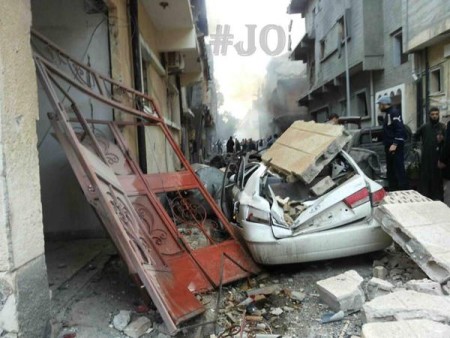PHOTO: Aftermath of Egyptian bombing of Derna in eastern Libya on Monday
On Monday, Egyptian warplanes bombed the city of Derna in eastern Libya, following the Islamic State’s execution of 21 Egyptian Coptic Christians in the Libyan coastal town of Sirte.
See Egypt Developing: Egyptian Jets Hit Islamic State in Libya After Execution of 21 Copts
The political crisis in Libya was building long before this week’s events. Soon after the downfall of long-time ruler Moammar Qaddafi in October 2011, the country was beset by division, rival militias, and economic difficulties including strikes at its oil terminals.
The Government has failed to achieve legitimacy. Indeed, there are now two Governments: one in Tripoli and one in Tobruk in the east of the country.
Rebecca Murray writes for Al Jazeera English, on the fourth anniversary of the uprising against Qaddafi:
Just off of Rashid Street in Tripoli’s downtown, with its grimy cluster of shops selling a black market mix of cheap Turkish-made guns and bullets, Jamal, a mobile phone store owner, laments the deterioration of Libya’s security.
“Everyone has a gun now,” he says, after jokingly asking one customer if he belonged to Daesh, the Arabic name for the Islamic State of Iraq and the Levant (ISIL), which claimed responsibility for executing 21 Christian Egyptians on a Libyan beach on Sunday. “Before the revolution no one had a gun, and it was peaceful. Now there is a lot of violence and business is bad.”
February 17 marks the fourth year since the official start of the Libyan revolution, which ended in the brutal overthrow of former dictator Muammar Qaddafi’s regime in October 2011. The following year, euphoria swept through Libya as revolutionary fighters, activists, government workers, businesspeople, students and their families celebrated being free of a controlling state apparatus that had spanned four decades. Exiled Libyans jubilantly returned home and the world’s media flew in to witness Libya’s first democratic national elections.
But behind the optimism were ominous signs the state was slowly spinning out of control.
Benghazi, where the revolution initially started, demanded a bigger voice in government. Under a weak transitional leadership, weapons from Gaddafi’s stockpiles were plundered and smuggled across borders, and heavily armed militias proliferated.
While ministry heads were changed, most government staff remained in lifelong positions and corruption marred the massive financial payouts to revolutionary fighters and people wounded in the war.
Meanwhile, the destruction of religious shrines occurred in broad daylight, and local media, activists and NGOs were gradually silenced by mounting threats, attacks and disappearances.
“The best year was just after the revolution – everyone was active,” Mona, a 23-year-old graphic designer, told Al Jazeera. “We all wanted to make our country better. Now that feeling is gone. There is no change; in fact, things are worse. You can’t speak out politically, and there are a lot of guns. If men get into a fight, they do it with guns.”
Now Libya is bitterly split. It has two opposing governments, parliaments and fighting forces, intent on seizing the country’s power and assets.
There is Prime Minister Abdullah al-Thinni’s Tobruk-based government and House of Representatives, backed by General Khalifa Haftar and his “Operation Dignity” or “al-Karama” military campaign. Although the Libyan Supreme Court ruled this parliament to be illegal and unconstitutional last November, it is recognised by the US, the European Union, Egypt and the UAE.
Their opponents are Prime Minister Omar al-Hassi’s government and the “Libya Dawn” or “Fajr Libya” forces, which seized control of Tripoli after fierce fighting for control of the city’s airport last year.
Ignoring the diverse makeup and increasing splits within each political coalition, al-Karama simplistically brands its Fajr Libya opponents as “Islamic extremists”, while the Fajr Libya alliance wrongly condemns all foes as “former Gaddafi loyalists”. They are fighting each other in Benghazi, the Sidra oil basin, the west and, by proxy, the southern town of Ubari.

